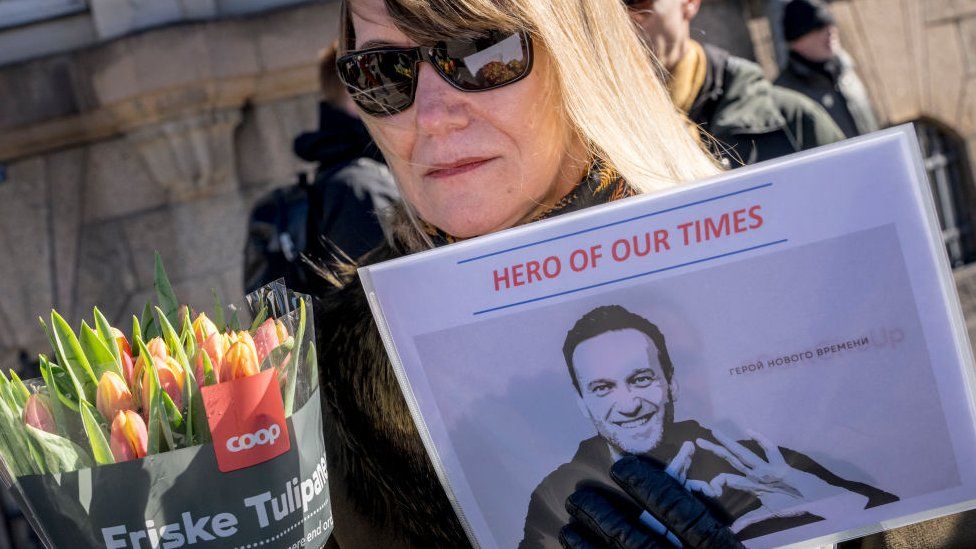Putin finally names Navalny and claims he agreed prisoner swap
- Published

Vladimir Putin has always refused to refer to his main opponent in Russia by name, but now that Alexei Navalny is dead, he has changed tack.
After claiming his fifth term as president, he told reporters: "As for Navalny, yes he passed away, this is always a sad event."
He also suggested he had agreed Navalny could be part of a prisoner swap.
Navalny's colleagues say he was murdered in an Arctic jail by Russian authorities, who cite natural causes.
US President Joe Biden said at the time it was "yet more proof of Putin's brutality".
Mr Putin said on Sunday night that a few days before Navalny's death, he had been told by people who were not part of his administration of a planned swap "for some people" held in the West.
He said he had agreed immediately on condition that Navalny never came back: "But, unfortunately, what happened, happened."
Some have seen in the Russian leader's remarks an attempt to distance himself from Navalny's death. Exiled Russian journalist Roman Dobrokhotov said it was an attempt to show "it was unprofitable for me, I wanted to exchange him".
But Navalny's chief of staff, Leonid Volkov, said the Russian leader's remarks showed that "now he has decided he doesn't need to pretend any more".
Commentators believe Mr Putin has previously used Navalny's name only once, in 2013, when he was asked why he shunned it.
At the time, he argued Navalny was only one of many opposition leaders, even though he had recently come runner-up in Moscow's mayoral election.
Independent journalist Farida Rustamova suggested Russia's long-time leader now felt able to say his adversary's name, because in his eyes Navalny no longer posed a threat.
In his remarks, Mr Putin compared Navalny's death in jail to cases of people dying in custody in the US: "They've happened, and more than once."
Maria Pevchikh, a colleague of the late opposition leader, said she was lost for words at Mr Putin's cynicism.
It was Ms Pevchikh who said in the aftermath of Navalny's death that he was close to being exchanged for a Russian hitman serving a life sentence for murder in Germany.
Vadim Krasikov was jailed for life for the 2019 murder of a Chechen exile in a park in Berlin. Zelimkhan Khangoshvili had fought Russian troops as a rebel commander in Chechnya years before and later claimed asylum in Germany.
Two US citizens held in Russia were also part of the planned swap, according to Ms Pevchikh, who said negotiations had reached a final stage the day before Navalny's death on 16 February.
But the US said on Monday that Navalny's name had not been mentioned as part of any talks involving a prisoner swap.
Speaking at a White House press briefing, US national security adviser Jake Sullivan said: "If this is something they were interested in, it certainly sounds like they are coming to it quite late, in fact too late obviously since he is no longer alive, because we did not hear that from them before."
Although the Kremlin never confirmed that talks had been going on, President Putin had already indicated that Vadim Krasikov could be swapped for Evan Gershkovich, a Wall Street Journal reporter who has spent almost a year in a Russian jail.
Another American, Paul Whelan, has been held in Russian detention for more than five years, while US-Russian journalist Alsu Kurmasheva was arrested last October.
The Russian leader has not mentioned Krasikov by name, referring last month to someone who had "due to patriotic sentiments, eliminated a bandit in one of the European capitals", implying that the killer had acted by himself.
Judges at Krasikov's trial ruled that the murder had been ordered by Russian state authorities and the government in Berlin expelled several Russian diplomats in response to the attack.
Related Topics
- Published17 March
- Published16 February
- Published26 February
- Published15 December 2021